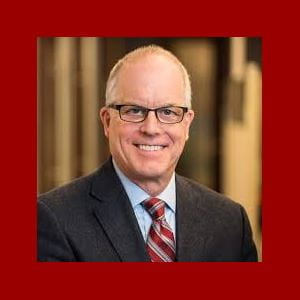Last week, Dr. Eric Meslin, PhD, FCAHS, spoke to the IU Center for Bioethics on the infiltration of artificial intelligence (AI) into healthcare and its potential to wreak bioethical havoc in a presentation entitled, “How Will AI Disrupt Healthcare, and Bioethics?” In this IUCB blog post, I’ll introduce Dr. Meslin, and then discuss his talk.
Dr. Meslin visits us from Canada, where he is President and CEO of the Council of Canadian Academies. He also currently serves as a Senior Fellow for the PHG Foundation at the University of Cambridge, Academic Affiliate at the University of Oxford, and Adjunct Professor at IU McKinney School of Law. From 2001–2016, he served as Founding Director of the IU Center for Bioethics, as well as Dean of Bioethics at the IU School of Medicine (IUSM). While at IUSM, Dr. Meslin also served as Endowed Professor of Philosophy, Professor of Medical and Molecular Genetics, and Professor of Public Health.
Now, for Dr. Meslin’s talk. Undeniably, technology and artificial intelligence are infiltrating healthcare, creating newfangled opportunities for personal patient data analysis, clinical imaging, diagnostics, and health administration workflow. But are these innovations disrupting the health landscape, or are they predictable extensions we have the means to ethically regulate?
To answer this question, Dr. Meslin considers Christensen’s 1997 theory of disruptive innovation, which describes the ability of small, resource-poor businesses to enter markets dominated by larger, incumbent businesses. These small businesses promote new technologies ignored or unstudied by said incumbents (who would rather spend their resources and generate guaranteed profit by bolstering existing technologies). When these new technologies offered by the smaller businesses have become mainstream, they have successfully disrupted established socioeconomic (and, by analogy or extrapolation, healthcare) systems. For a healthcare-specific definition of disruption, Dr. Meslin offers a more modest description: technological disruption occurs when a technology is seen to intersect “with an accepted trajectory of innovation, application, and integration of technology or practice into the delivery of healthcare.” It appears to me that both definitions may generate distinct answers to the question of the current level or potential of disruption of AI in healthcare, depending on the assumptions made by the asker.
For Christensen’s definition, we must be willing to consider established healthcare delivery services an ‘incumbent business’ and patients as customers. We can consider new start-up companies (e.g. 23andMe) to have overtaken certain market niches by selling novel health-related services that classical hospital and healthcare systems do not, thereby generating capital and esteem. To me, this definition of disruption is mostly economic in nature, and presupposes that our bioethical and health infrastructure cannot compensate for the vicissitudes of market capitalism. This discussion raises interesting questions: Can we approximate healthcare as a market, and, if so, how will we ethically regulate upstarts and their services? Besides your standard FDA approval, these unique patient services are not thoroughly vetted. Furthermore, they are not allocated according to any bioethical framework. Should they be? What is the relationship between ethics and free enterprise?
Dr. Meslin’s definition of disruption, that technology essentially outpaces its expected trajectory in the healthcare setting, assumes that our bioethical frameworks are incapable with keeping up with technological advancement, or for some reason that they will soon be unfit to do so. How can we tell if technology is outstripping our ethical framework? Dr. Meslin points to the fact that is takes 10-15 years to fully legislate and evaluate new technologies, but, these days, new technologies are outdated 5-7 years after conception. What does this mean for ethicists? Will a deluge of innovation spark ethical specialization in attempts to keep up? Would specialization fractionate and/or immobilize the current field?
Dr. Meslin raises critical questions for us, as (bio)ethicists, to consider. We need to decide whether our work is enough to sustain contemporary innovation, and how we can maintain or regain our lead. Watch Dr. Meslin’s talk in its entirety here.
